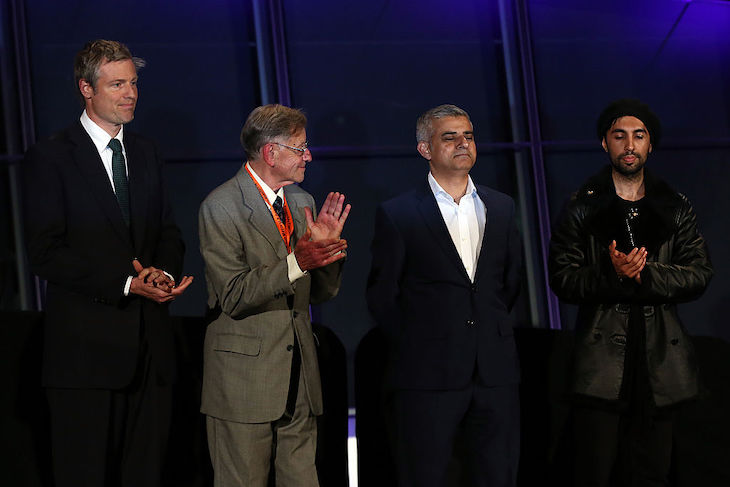The Tories have a problem with anti-Muslim prejudice. There is a pathology there. It’s not hard to see. And it runs from the vulgarised dog whistle stuff, like Conservative councillors and activists who feel comfortable sharing crude Islamophobic content, right up to the CCHQ campaign tactics which led to Zac Goldsmith’s ill-thought through targeting of Sadiq Khan’s links to his local mosque. And it reflects what makes the Corbyn anti-Semitism stuff so alarming – an intellectual basis for making one community a menace to the whole fabric of UK society.
Understanding why anti-Semites seem to feel comfortable in the Labour Party gives us a good indication why there appears to be space in the Conservative Party for those who indulge in anti-Muslim prejudice.
Corbyn expresses in vulgarised terms the substance of Tony Benn’s analysis of domestic and international affairs, in which patriotic nationalisation programmes at home are complemented by an ‘anti-fascist’ foreign policy abroad, focused in particular on the Israel-Palestine conflict.
Benn’s love of popular democracy (which comes from the old nonconformist radicalism of the Levellers and the Chartists) has mutated into a distrust of international elites, often articulated in crude ‘greedy banker’ slogans. And legitimate focus on the treatment of the populations of the West Bank and Gaza has metastasised into a picture of the Middle East that gives an outsize influence to Israel’s historical role and its historic links with American foreign policy. It’s not hard to see how that creates the atmosphere in which anti-Semites feel at home.
So when Corbyn has faced calls to disown anti-Semitism, there is this nagging thought – that he may not like the rhetoric, but the structure of it is basically correct. And it is in that bad thought that anti-Semitic ideas begin to incubate and flourish.
Anti-Muslim prejudice is often positively contrasted with the ‘ingrained’ anti-Semitism in the Labour Party as a case of just a few bad apples. And it’s an easy story to write: the Tory party isn’t interested in culture wars; it rejected the race politics of Enoch Powell and embraced Thatcherism, with its focus on emancipation through participation in economic life. But that story is now out of date.
A personal example – in 2017, I went along to a day of interviews, discussion groups and lectures by leading conservative thinkers. And I mean leading thinkers – men and women who are indelibly associated with conservative thought in the public eye. The conversation ranged across housing, education, Brexit (of course) and constitutional history. It became obvious to me that there was something weird going on. Every single topic came back to the threat of Islam. It was Muslims who were failing to engage with conservative notions of identity, conservative plans for a more patriotic education system, conservative constitutional reform.
And it was Islam that posed an existential threat to Western civilisation, with a potpourri of illiterate speculations about the historical differences between Christian and Islamic cultures, the former said to preserve a distinction between the temporal rule of Kings and divine authority, and the latter collapsing them into a totalitarian unity.
There was no intellectual energy devoted to thinking about the specific history of modern political Islam, which is varied and closely engaged with Western notions of political order. And there was no energy devoted to working out why there are lots of majority Muslim countries with a pretty vibrant democratic culture.
Two reasons have emerged relatively recently that go some way to explaining why anti-Muslim prejudice has found a home on the political right. Post-9/11 anxiety led to the dark cultural pessimism of the American neo-conservative movement becoming fashionable: take Michael Gove’s analysis of the London terror attacks – in his book Celsius 7/7 – which compares Islamism to European totalitarian ideologies of the twentieth century.
And then there is the most recent experience of homegrown terror in Northern Ireland, where IRA activity was seen as a community-driven phenomenon, in which cells were incubated with the tacit sympathy of those around them.
Now radicalisation isn’t like that – it often starts off as youthful rebellion against parents and traditional religious authority figures and mutates into the unyielding radicalism which has much more in common with Western ‘world-rejecting’ New Religious Movements (like the Westboro Baptist Church) than with Islam as it is practised in general. When parents of jihadists say ‘they had no idea’ about their sons’ dreams of terror, they’re more often than not telling the truth.
There is always some element of irrational, unfocused hatred of ‘the other’ inherent in most political traditions, but anti-Muslim feeling is a form of prejudice like any other with its own internal coherence (however morally abhorrent) – the Tories are not immune.






Comments